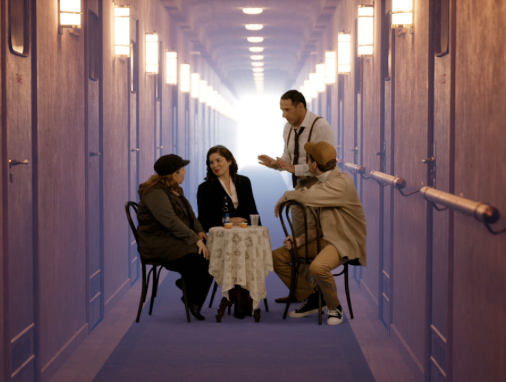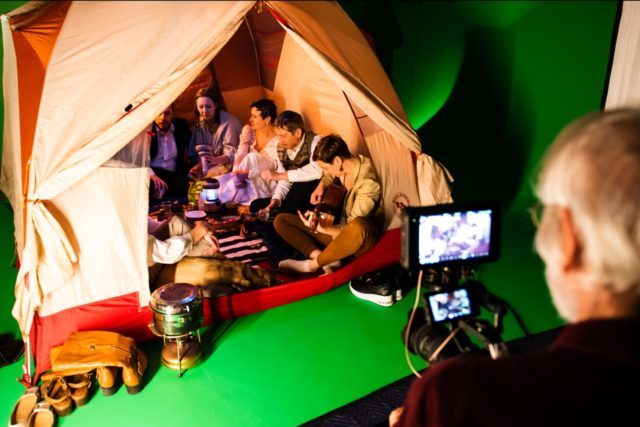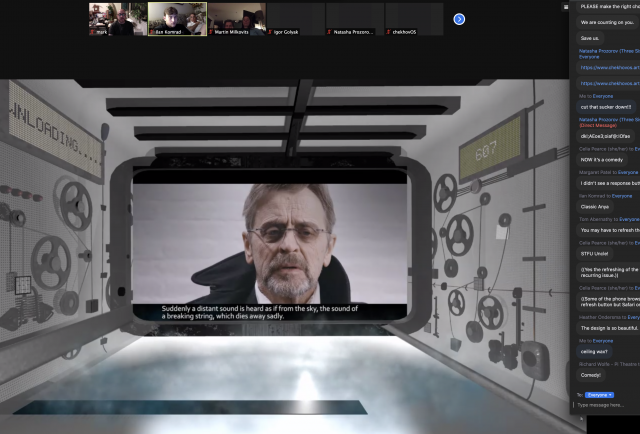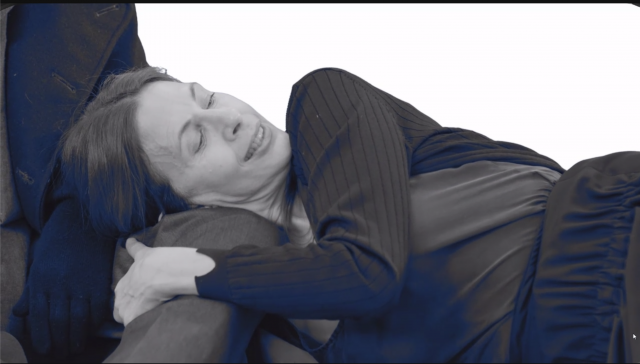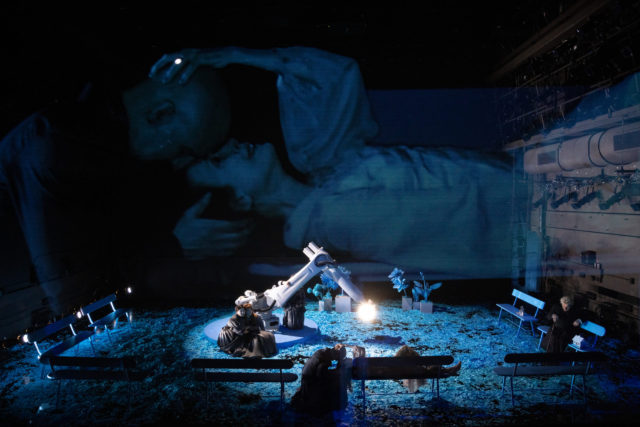
Arlekin Players Theatre presents a hybrid multimedia adaptation of Anton Chekhov’s The Cherry Orchard (photo by Maria Baranova)
THE ORCHARD
Baryshnikov Arts Center, Jerome Robbins Theater
450 West 37th St. between Ninth & Tenth Aves.
Tuesday – Sunday through July 3, $39-$125 in person, $29 virtual
646-731-3200
bacnyc.org
www.theorchardoffbroadway.com
During the pandemic lockdown, Arlekin Players Theatre reinvented what online theater could be. The Needham, Massachusetts–based company presented three works that offered people sheltering in place the opportunity to experience and participate in live productions incorporating videogame technology: State vs. Natasha Banina, a one-woman Zoom play in which the audience votes on the ultimate verdict; Witness, which takes viewers on board the MS St. Louis, the German ship carrying nearly a thousand Jewish refugees in May 1939 escaping the approaching Holocaust; and chekhovOS /an experimental game/, a virtual, interactive reimagining of scenes from The Cherry Orchard, a combination of live and prerecorded segments and an integral live chat, with Tony nominee Jessica Hecht as Madame Lyubov Andreievna Ranevskaya and Mikhail Baryshnikov as Anton Chekhov.
Arlekin founding artistic director Igor Golyak has steered full steam ahead with The Orchard, a bumpy two-hour intermissionless adaptation of Chekhov’s tragicomedy that can be seen live and in person through July 3 at the Baryshnikov Arts Center’s Jerome Robbins Theater and/or livestreamed with interactive elements. The best way to experience The Orchard is to first go to the theater, then follow it up virtually, as the two iterations feed off each other, filling in gaps that can form if you see only one of the formats. Yes, it’s a four-hour commitment, but seeing both brings it all together; viewing only the in-person version is likely to leave you impressed but scratching your head too much.
Hecht is phenomenal as Ranevskaya, a lost soul who has returned from Paris to try to save her beloved cherry orchard and estate, which is being put up for auction because the family is in debt. Also back from chekhovOS are Mark Nelson as Gaev, Ranevskaya’s brother, who, like his sister, doesn’t seem to understand the situation they’re in, and Nael Nacer as Lopakhin, whose father and grandfather were serfs toiling for the siblings’ ancestors and who is now trying to convince these faded nobles that their only option is to cut down the orchard and sell off plots for summer vacation homes, which will make them rich again.
But Ranevskaya and Gaev are like children, stuck in the past, refusing to acknowledge reality. They play with balls and spinning tops, marvel at governess Charlotta’s (Darya Denisova) magic shows, and pretend they’re playing billiards. The estate itself is represented by a tiny model of a house, as if everyone is living inside a toy. Ranevskaya is hoping that her teenage daughter, Anya (Juliet Brett), will marry perpetual student and tutor Trofimov (John McGinty) and that her adopted daughter, Varya (Elise Kibler), who manages the estate, will become betrothed to Lopakhin, who is actually in love with Ranevskaya herself. Meanwhile, the aging, ever-more-feeble servant Firs (Baryshnikov) putters about, mumbling to himself and attempting to carry out his longtime duties.
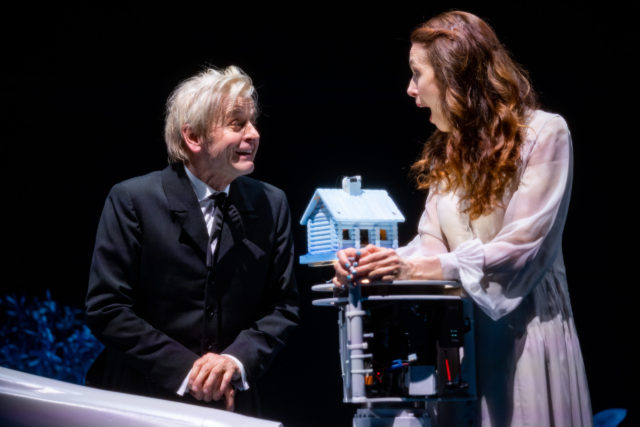
Firs (Mikhail Baryshnikov) and Madame Ranevskaya (Jessica Hecht) watch over the family estate in The Orchard (photo by Maria Baranova)
Carol Rocamora’s translation has eliminated landowner Boris Borisovich Simeonov-Pishchik, estate clerk Yepikhodov, maid Dunyasha, servant Yasha, and other minor characters to focus on the main figures as Chekhov explores the changing sociopolitical times that are going to leave the family behind. Meanwhile, the homeless passerby has been turned into a tough-talking soldier who threatens the others in Russian, evoking the current war in Ukraine. (Earlier references to Mariupol, Kharkiv, and Kyiv also remind the audience of the invasion; Golyak was born in Ukraine and has done charitable work with the company to help the people in his native country.)
But Golyak, who has also established the Zero Gravity (zero-G) Virtual Theater Lab, has added two key “characters”: a robot dog that sticks around Charlotta and, just off center, a large white Clicbot robot, resembling some kind of newfangled medical machine, that serves as a tree, a bookcase, and a mobile camera. It is big and bulky and sometimes gets in the way of the story, but it also is a kind of omniscient narrator, disruptor, and even safe haven. When the soldier confronts the others, they huddle on the robot’s platform, as if that will protect them. (Tom Sepe is the robotics designer.)
Once the auction is over, the family still won’t face the truth as the end of their legacy approaches.
Anna Fedorova’s set consists of robin’s-egg-blue benches and thousands of blue cherry blossoms scattered across the floor. The backdrop is reminiscent of thin, interconnected tree roots reconfigured as lightning strikes. Words and images are projected onto a front translucent screen, but they are often unnecessary, repeating what we are already seeing or confusingly blurry. (The projections are by Alex Basco Koch, with dramatic lighting by Yuki Nakase Link, fine period costumes by Oana Botez, music by Jakov Jakoulov, and sound by Tei Blow.)
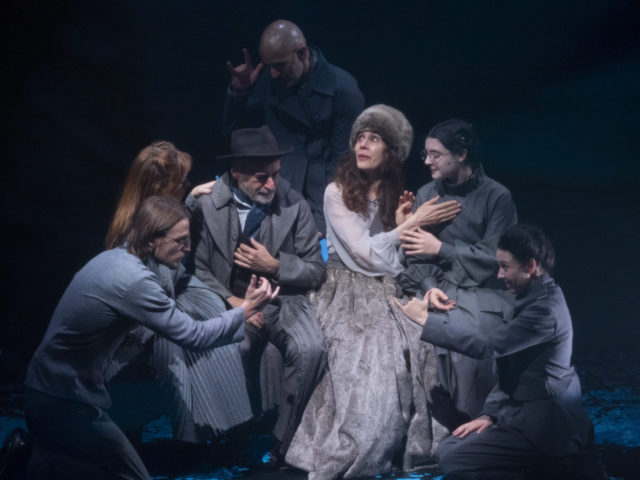
Family and friends huddle as the end approaches in hybrid world premiere at BAC and online (photo by Pavel Antonov)
Several scenes feel extraneous, but their inclusion becomes clearer when you watch the livestream, which kicks off with a virtual tour of BAC rechristened as the Orchard and up for sale; a Zillow page shares the details of the property, which you can navigate through as a 360-degree environment. Amid rain and thunder, a prerecorded Chekhov, portrayed by the seventy-four-year-old Baryshnikov, enters the building. You move through hallways and enter various doors, behind which are six rooms, three of which you should have time to wander in: The Operation Room allows you to remove items from Chekhov’s body as he suffers from tuberculosis; peepholes let you see inside the Orchard Room, where Chekhov and his wife, Olga Knipper (Hecht), converse, in text from actual letters; and the Labyrinth Room is a kind of maze with numerous Chekhovs speaking in different videos. There are also the Winter Fishing Room, the Train Room, and the Space Room, where Chekhov/Baryshnikov cheekily notes, “I am tired as a ballet dancer after five acts and eight tableaux.” (Chekhov completed The Cherry Orchard while facing serious illness; he died of TB in 1904, six months after the show opened.)
Soon the stream links up with the live action occurring in the theater, which is shown through multiple static cameras as well as the soldier’s helmet cam, Charlotta’s handheld camera, and, mostly, the robotcam positioned at the end of the robot’s head. During these moments, you can choose which camera to watch through, offering varying perspectives of what’s happening onstage, with differing levels of visual quality. (Adam Paikowsky is the designer of emerging technologies, Alexander Huh the interactivity designer, Athomas Goldberg the technical designer, Alexey Prosvirnin the virtual sound designer, Daniel Cormino the 3D environment artist, and Yu-Jun Yeh the Unreal technical artist.)
In the scene in which Varya asks Trofimov to tell everyone about the stars and the planets, images are visible on the scrim, but online the effect is far more dynamic, as if the characters are surrounded by these colorful orbs and constellations. While Charlotta performs magic tricks onstage, which feels superfluous, it is relegated to the backdrop of the stream, where Ranevskaya, in real time, is responding to bidders’ questions about the estate and cherries.
This Orchard is very much about communication and connection, particularly at the intersection of major technological advances. In three successive scenes, the in-person audience is left at least partially in the dark as Lopakhin converses in untranslated French, the soldier speaks in untranslated Russian, and Trofimov, portrayed by the deaf McGinty, uses sign language that might not be interpreted perfectly by Anya. Ranevskaya gets a series of letters from Paris but chooses to rip them up instead of reading them. Meanwhile, throughout the play, Firs often speaks in non sequiturs, not always making sense although occasionally sharing the wisdom of a life long-lived.
Shortly after returning from Paris, Raneveskaya says, “Thank you, Firs, thank you, my darling old man. I’m so glad you’re still alive.” Firs responds, “The day before yesterday.” Gaev explains, “He’s hard of hearing.” But when Charlotta asks, “Who I am, and where I’m from — I don’t know . . . Who were my parents, were they ever married — I don’t know that, either. I don’t know anything,” Firs says, “You know more than you think you know.”
The deep dive into how we communicate is an issue that emerged during the coronavirus crisis as people used Zoom, social media, and other platforms to stay in touch when actual touch was either not allowed or too risky. Golyak and Arlekin came up with unique ways to stay connected with audiences by employing and expanding on cutting-edge technology to present interactive productions to a population starving for live entertainment. In trying to walk the fine hybrid line, The Orchard has its stumbles, particularly in its ambitious in-person staging, but the virtual aspect prepares us for what might come — and don’t forget to scan that final barcode for an AR bonus.
